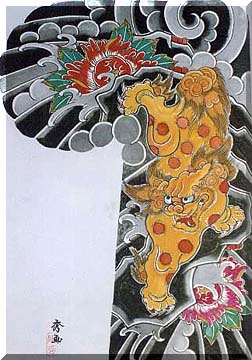Kara-jishi: Difference between revisions
(Created page with "<html><div class="mw-content-ltr" dir="ltr" id="mw-content-text" lang="en"><div class="floatright"><a class="image" href="/index.php?title=File:Kara-Jishi.jpg"><img alt="Kara-Jishi.jpg" height="360" src="/images/1/14/Kara-Jishi.jpg" width="252"/></a></div> <p>The <b>kara-jishi</b> (唐獅子, lit. "China Lion") is a Japanese mythological animal. The kara-jishi is venerated in East Asia—especially in <a class="new" href="/index.php?title=Buddhism&action=edit&red...") |
(Page conversion via llm-mediawiki-rev -jwm) |
||
| Line 1: | Line 1: | ||
[[File:Kara-Jishi.jpg|thumb|right|Kara-Jishi.jpg]] | |||
The '''kara-jishi''' (唐獅子, lit. "China Lion") is a Japanese mythological animal. The kara-jishi is venerated in East Asia—especially in [[Buddhism|Buddhism (page does not exist)]]—as the king of all animals. Pairs of stone kara-jishi are commonly displayed at the entrances to temples and shrines as guardians. | |||
In [[Horimono|horimono]] tattoos, the kara-jishi is almost exclusively depicted with the peony, or ''botan'', which is correspondingly considered the king of all one hundred flowers; a tattoo of the two kings together represents the pinnacle of the terrestrial kingdom. | |||
As many tattoo artists in the West incorporate Japanese designs into their work, the kara-jishi can be seen in many tattoos in America and Europe; curiously North Americans often refer to the kara-jishi as a "Foo Dog," although originally according to Chinese mythology, they represent lions. | |||
== Related Articles == | |||
*[[Japan]] | |||
Latest revision as of 06:35, 17 September 2023
The kara-jishi (唐獅子, lit. "China Lion") is a Japanese mythological animal. The kara-jishi is venerated in East Asia—especially in Buddhism (page does not exist)—as the king of all animals. Pairs of stone kara-jishi are commonly displayed at the entrances to temples and shrines as guardians.
In horimono tattoos, the kara-jishi is almost exclusively depicted with the peony, or botan, which is correspondingly considered the king of all one hundred flowers; a tattoo of the two kings together represents the pinnacle of the terrestrial kingdom.
As many tattoo artists in the West incorporate Japanese designs into their work, the kara-jishi can be seen in many tattoos in America and Europe; curiously North Americans often refer to the kara-jishi as a "Foo Dog," although originally according to Chinese mythology, they represent lions.
